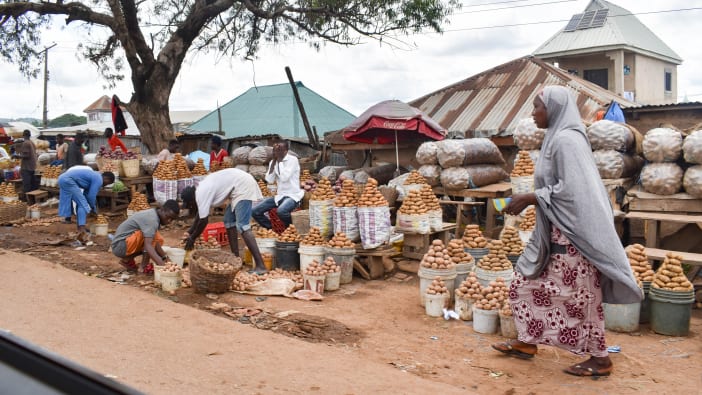The church and community being transformed
And for Pastor Yalgado’s church, some of that solution came in the form of training run by Tearfund. The sessions included sharing vision and talking about integral mission [the idea that the local church is also called to address the practical needs in their community]. Following on from this, Pastor Yalgado and the church leaders were encouraged to start running the training and Bible studies they had received with members of the church and the community. It was a great success! ‘We brought together 30 women – 15 from our congregation and another 15 non-Christians,’ says Pastor Yalgado.
As a result, the church drew up an action plan to start to respond to some of the community’s needs.
‘With these activities, we're able to bring the community and church together to show them that we’re also interested in community life,’ says Pastor Yagaldo. ‘Our activities have reached many people!’
Soap, food and water
Part of the action plan involved teaching women in the community how to make soap. It was an activity that drew many people in – including a large number who wouldn’t usually go to church. As well as providing the women with a useful skill, the training gave the church an opportunity to share about Christ and the gospel.
Encouraged by the success of this activity in the church, the senior pastor and Pastor Yalgado arranged a meeting with the local imam and other community leaders to start to build relationships and to talk about ways that they can all work together to find solutions for the challenges people in the community are facing.**
As a result, members of Abundant Life church gathered together bags of food and soap to share among many of the internally displaced people in their community. They were able to bless people who have had to flee their homes in other parts of the country because of violence or climate disasters and who now live in extremely difficult conditions and often don’t have enough to provide for their needs.
Looking forward to even more
The church’s plans have been a success so far, but Pastor Yalgado believes there is more to be done. ‘Looking ahead,’ he says, ‘we're planning to build a water point for the whole community, because we have a water problem in the neighbourhood. We'll also be taking stock of what we've been able to achieve under our action plan, to start the activities we weren't able to do in 2023.’
*What is CCT?
CCT starts with the Bible.
Local church members – or, in many cases, the church leader – receive training to facilitate Bible studies. These studies encourage people to recognise the church’s mandate to address the practical needs in their communities and to identify the resources they have available to start to respond.
The Bible studies always end with a call to action. It may be something small to start with, such as committing to changing a way of thinking, but the action can quickly grow in scale to things like improving or building schools, clinics and roads.
Tearfund and our local partner organisations don’t fund these initiatives – but we equip participants with all the practical knowledge and skills they need to carry out these plans. This might also include things like building self-help groups where people can learn to save together.
In this way, whole churches and communities can find themselves working together to bring about change – helping people to lift themselves out of poverty for good and to realise their God-given potential.
Read more about it here.
**This kind of work is exactly in line with what the United Nations Office for the Coordination of Humanitarian Affairs (OCHA) has pointed out in this report is needed to bring sustainable relief to the region. It says, ‘Moving from the distribution of emergency packages towards community-based resilience- and solutions-focused support will be critical to efforts to address the displacement crisis more sustainably, particularly for 39 per cent of IDPs who have been displaced for two or more years. It also represents an appropriate evolution of action in response to feedback from affected communities about their needs and preferences and will help to address the expectations of national authorities relating to the engagement of international partners. The current situation is on the cusp of becoming a protracted crisis, solid groundwork must be laid for durable solutions for the displaced and their host communities.’












